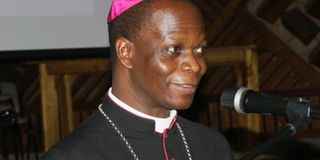Catholic Church defends religious education

Bishop Maurice Muhatia at a past event. PHOTO | ANTHONY OMUYA |
What you need to know:
- Bishop Maurice Muhatia rejects suggestions to drop RE.
- Suggestions were made recently on national TV by Harrison Mumia, an atheist.
The Catholic Church has criticised suggestions that religious education be abolished in schools.
Commission for Education and Religious Education chairman Maurice Muhatia said the Catholic Church fully supports the continued teaching of religious education in all educational institutions.
“Withdrawing religious education from our school curriculum is tantamount to rejection of the supremacy and importance of God in the lives of young people and the society,” he said in a statement.
Bishop Muhatia warned that a society that turns away from God is doomed and therefore Kenya must continue to teach religious education in all schools.
The suggestions were made recently on national TV by Harrison Mumia, an atheist.
Bishop Muhatia said the important role religious education plays in moulding the values of society cannot be downplayed.
The Bishop said the Constitution recognises the role of religion in society and grants all Kenyans freedom of conscience and belief as well as the right to practice their faith and teach it.
“It is totally unacceptable for a few individuals to purport to influence curtailing the same rights and freedoms by recommending the scrapping of religious education from our school curriculum,” said Bishop Muhatia.
MUST BE HANDED DOWN
He observed that school curriculum is an expression of the important beliefs, values and aspirations of society, including religious ones, which must be handed down to the young.
“For the Catholic Church, faith and holistic quality education are inseparable. It is our considered view that there can be no quality formation of children to become responsible citizens if their education is not anchored on their religious faith,” he added.
Religious education, Bishop Muhatia said, plays an integral and critical role in preparing learners for adult life, employment and life-long learning while encouraging them to develop their sense of identity and belonging.
“Religious education enables children to flourish individually within their communities and as citizens in a pluralistic society and global community,’ he said.
Already, the Basic Education (Amendment) Bill by National Assembly’s Education Committee vice-chairman Julius Melly which is before Parliament has proposed that the Education Cabinet secretary will be required to make regulations for integration of the madrassa, Duksi and pastoral programmes of instruction into the formal education system as appropriate to improve access and retention.
The Bill also proposes that the government meet the cost of paying Chaplains which was previously the duty of a sponsor.





